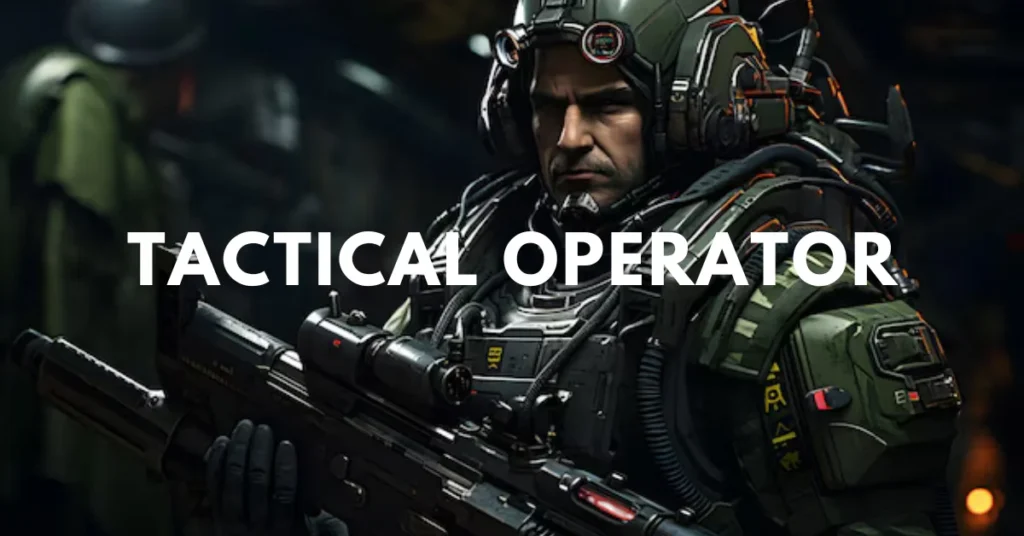Introduction to Tactical Operator and its Roles
Tactical operators are the backbone of high-stakes missions, serving in various roles that demand precision, skill, and a keen instinct for strategy. Whether it’s a hostage rescue or counter-terrorism operation, these professionals work behind the scenes to ensure safety and success. But what exactly does it mean to be a tactical operator? This blog post explores the diverse types of tactical operators you might encounter on the frontlines. From their unique responsibilities to the specialized training they undergo, we’ll delve into what sets each role apart. So buckle up as we navigate through this thrilling world where every decision counts!
The Different Types of Tactical Operators
Tactical operators come in various types, each specializing in distinct areas of operation.
SWAT teams are perhaps the most recognized. They handle high-risk situations like hostage rescues and armed standoffs.
Counter-terrorism units also play a vital role. These specialists focus on preventing and responding to terrorist incidents, often working under immense pressure.
Military special forces bring another layer of expertise. Their training allows them to conduct covert missions, intelligence gathering, and unconventional warfare.
Then there are K9 units that utilize trained dogs for search-and-rescue operations or bomb detection. The bond between handler and dog is crucial for success.
Tactical medics integrate medical skills into law enforcement operations. They provide immediate care during critical incidents where every second counts. Each type brings unique skills to the table, enhancing overall effectiveness in complex scenarios.
Responsibilities and Skills Required for Each Type
Each type of tactical operator has specific responsibilities that match their role. For instance, a close-quarters combat specialist must excel in hand-to-hand tactics and be adept with various firearms. Their job often involves navigating tight spaces while ensuring the safety of team members.
On the other hand, reconnaissance operators focus on gathering intelligence without being detected. They need strong observational skills and an ability to analyze situations quickly. Stealth is crucial for them.
Then there are explosive ordnance disposal (EOD) technicians who handle dangerous materials. Precision is vital here; they require extensive training in bomb disposal techniques and safety protocols.
All tactical operators share core skills like teamwork, critical thinking, and quick decision-making under pressure. These attributes ensure smooth operations regardless of their specialized focus within the team dynamic.
Training and Qualifications Needed for Tactical Operators
Training for tactical operators is rigorous and extensive. It typically begins with basic military training or law enforcement academy programs. This foundational phase develops essential skills in discipline, physical fitness, and weapon handling.
Once initial training concludes, specialized courses come into play. These can include advanced marksmanship, close-quarter combat tactics, and negotiation techniques. Each operator may follow a unique path based on their specific role within the team.
Certifications are also critical. Operators often pursue credentials in areas like emergency medical response or crisis intervention to enhance their skill sets further.
Physical endurance is crucial as well. Training regimes emphasize cardio workouts alongside strength training to prepare them for demanding missions.
Continuous education remains important throughout an operator’s career. Regular drills and simulations ensure that each member stays sharp and ready for any situation they might face in the field.
Challenges Faced by Tactical Operators
Tactical operators face a myriad of challenges that test their skills and resolve. The unpredictability of high-stakes environments can create intense pressure, requiring split-second decision-making.
Physical endurance is crucial, as operations often demand long hours in demanding conditions. Fatigue can impair judgment and performance, making resilience essential.
Mental health also plays a significant role. The nature of their work exposes operators to traumatic situations, which can lead to stress and anxiety if not addressed properly.
Communication barriers pose another challenge during complex missions. Clear coordination among team members is vital for success yet difficult in chaotic settings.
Staying updated with evolving technology requires constant learning. Tactical operators must adapt quickly to new tools while maintaining proficiency in traditional methods.
Importance of Teamwork and Communication in Tactical Operations
Effective teamwork is the backbone of any successful tactical operation. Each member brings unique skills and perspectives, enhancing the group’s overall capability. When individuals collaborate seamlessly, they can adapt to changing situations with agility.
Communication plays a critical role in this dynamic. Clear and concise information exchange ensures that everyone understands their roles and objectives. It helps prevent misunderstandings that could jeopardize safety or mission success.
Trust among team members fosters an environment where ideas can flow freely. This openness leads to better problem-solving under pressure. Tactical operators rely on each other for support, both physically and mentally.
Regular drills strengthen these bonds, promoting familiarity with each other’s strengths and weaknesses. As trust builds, so does confidence in executing complex maneuvers during high-stakes situations. Effective communication combined with strong teamwork enhances operational efficiency and effectiveness on the field.
Conclusion
Understanding the various roles of a tactical operator is essential for anyone interested in this field. Each type of operator brings unique skills and responsibilities to their teams. From reconnaissance specialists who gather crucial intelligence, to direct action operators involved in high-stakes missions, every role plays a vital part in achieving operational success.
Training requirements can be rigorous, ensuring that each tactical operator is well-prepared for the challenges they may face. The emphasis on teamwork and communication cannot be overstated; these elements are often what separates successful missions from failures.
As you delve deeper into the world of tactical operations, consider how these diverse roles work together. Whether through specialized training or collaboration during missions, understanding each operator’s contribution enhances overall effectiveness and efficiency. The landscape of tactical operations continues to evolve, making it an exciting area for both professionals and enthusiasts alike.
FAQs
1. What is a “tactical operator”?
A tactical operator is a specialized professional trained to handle high-risk missions that require precision, strategic planning, and advanced skills. These operators work in various fields, including law enforcement and military units, and are involved in situations such as hostage rescues, counter-terrorism, and covert operations. Their roles are critical in ensuring safety and mission success through specialized training and teamwork.
2. How does a SWAT team differ from a counter-terrorism unit?
SWAT teams and counter-terrorism units both deal with high-risk situations, but their focus differs. SWAT teams primarily handle immediate, high-risk scenarios like hostage rescues and armed standoffs within a local or national context. In contrast, counter-terrorism units specialize in preventing and responding to terrorist threats, often working on a broader scale and dealing with threats before they escalate.
3. What kind of training do explosive ordnance disposal (EOD) technicians receive?
EOD technicians undergo rigorous training that includes bomb disposal techniques, safety protocols, and handling dangerous materials. Their training emphasizes precision and thorough knowledge of various explosive devices and materials. This training is essential to ensure they can safely and effectively manage and neutralize explosive threats.
4. Why is physical endurance so important for tactical operators?
Physical endurance is crucial for tactical operators because their missions often involve long hours in demanding conditions. High levels of physical fitness enable operators to perform optimally under stress, handle prolonged periods of exertion, and maintain sharp decision-making abilities even when fatigued. This endurance is critical for both the effectiveness and safety of their operations.
5. How do tactical medics integrate their skills into operations?
Tactical medics combine medical expertise with law enforcement or military operations. They provide immediate medical care during critical incidents, such as shootings or bombings, where traditional medical response might be delayed. Their role requires not only advanced medical skills but also the ability to operate under high pressure and coordinate with other tactical operators to ensure effective treatment in challenging environments.







